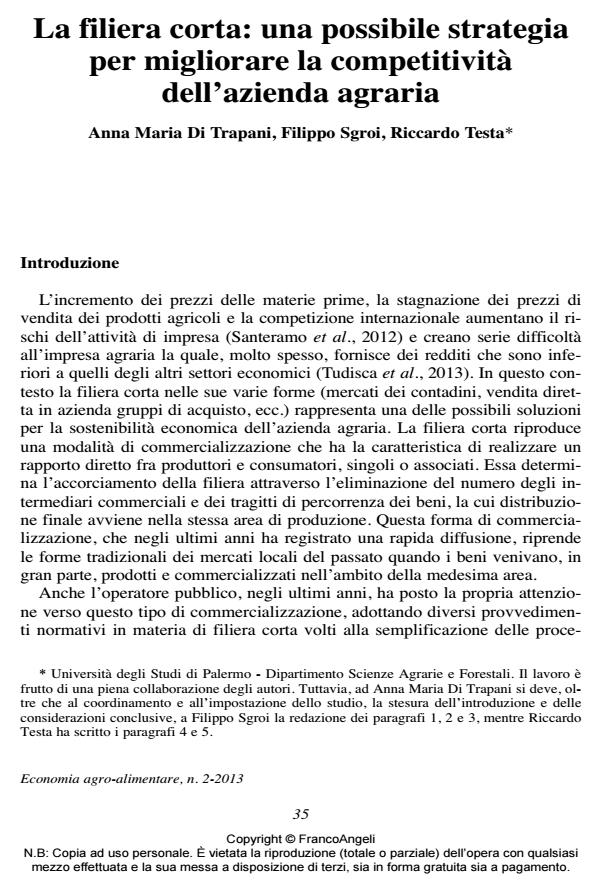La filiera corta: una possibile strategia per migliorare la competitività dell’azienda agraria
Titolo Rivista ECONOMIA AGRO-ALIMENTARE
Autori/Curatori Anna Maria Di Trapani, Filippo Sgroi, Riccardo Testa
Anno di pubblicazione 2013 Fascicolo 2013/2
Lingua Italiano Numero pagine 15 P. 35-49 Dimensione file 381 KB
DOI 10.3280/ECAG2013-002003
Il DOI è il codice a barre della proprietà intellettuale: per saperne di più
clicca qui
Qui sotto puoi vedere in anteprima la prima pagina di questo articolo.
Se questo articolo ti interessa, lo puoi acquistare (e scaricare in formato pdf) seguendo le facili indicazioni per acquistare il download credit. Acquista Download Credits per scaricare questo Articolo in formato PDF

FrancoAngeli è membro della Publishers International Linking Association, Inc (PILA), associazione indipendente e non profit per facilitare (attraverso i servizi tecnologici implementati da CrossRef.org) l’accesso degli studiosi ai contenuti digitali nelle pubblicazioni professionali e scientifiche.
The paper aims to determine the possible competitive advantage for farms thatadopt a short supply-chain strategy. In particular, by carriying out an analysis of asample of fruit and vegetable farms, we wanted to find out how the business relatesto the market and the reasons that induced the entrepreneur to move into a shortsupply-chain set up. The study was prompted by the wish to determine, empirically,the economic benefits arising from the adoption of the short supply chain. In fact,there is a vast literature on the economic benefits produced by the short supply chainsuch as the demand stability due to customer loyalty and the ability to influencedirectly the price through the reduction of production costs, especially oftransportation and packaging ones. In addition, the farmer may obtain greaterremuneration of production factors, re-appropriating a portion of the value thatusually gets eaten up during the various stages of the supply chain system, thusbecoming price-maker (Saccomandi, 1999). In particular, we focused our analysis ondetermining the net income of the entrepreneur who decides to pursue a shortsupply-chain strategy by comparing it, using the same parameters, with farms wherethere is not a short supply chain. From this empirical analysis it emerges that theshort supply-chain cannot be the only way to sell farm products, as it absorbs only apart of production. Nevertheless, it enables the entrepreneur the recoup a greaterproportion of production costs.
Parole chiave:Short supply chain, farm, competitiveness
Jel codes:Q12, Q31
- The Short Food Supply Chain: A Concrete Example of Sustainability. A Literature Review Sara Fabbrizzi, Nicola Marinelli, Silvio Menghini, in RIVISTA DI STUDI SULLA SOSTENIBILITA' 2/2014 pp.189
DOI: 10.3280/RISS2014-002012
Anna Maria Di Trapani, Filippo Sgroi, Riccardo Testa, La filiera corta: una possibile strategia per migliorare la competitività dell’azienda agraria in "ECONOMIA AGRO-ALIMENTARE" 2/2013, pp 35-49, DOI: 10.3280/ECAG2013-002003